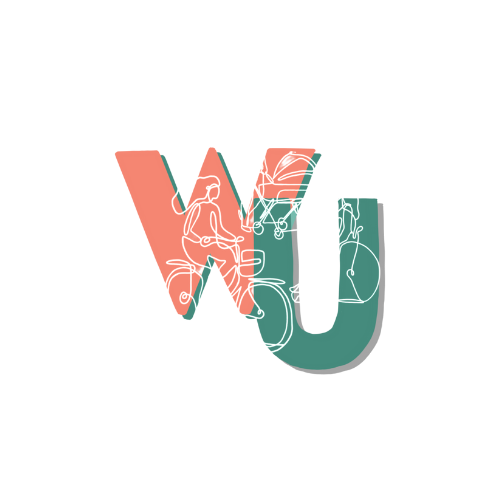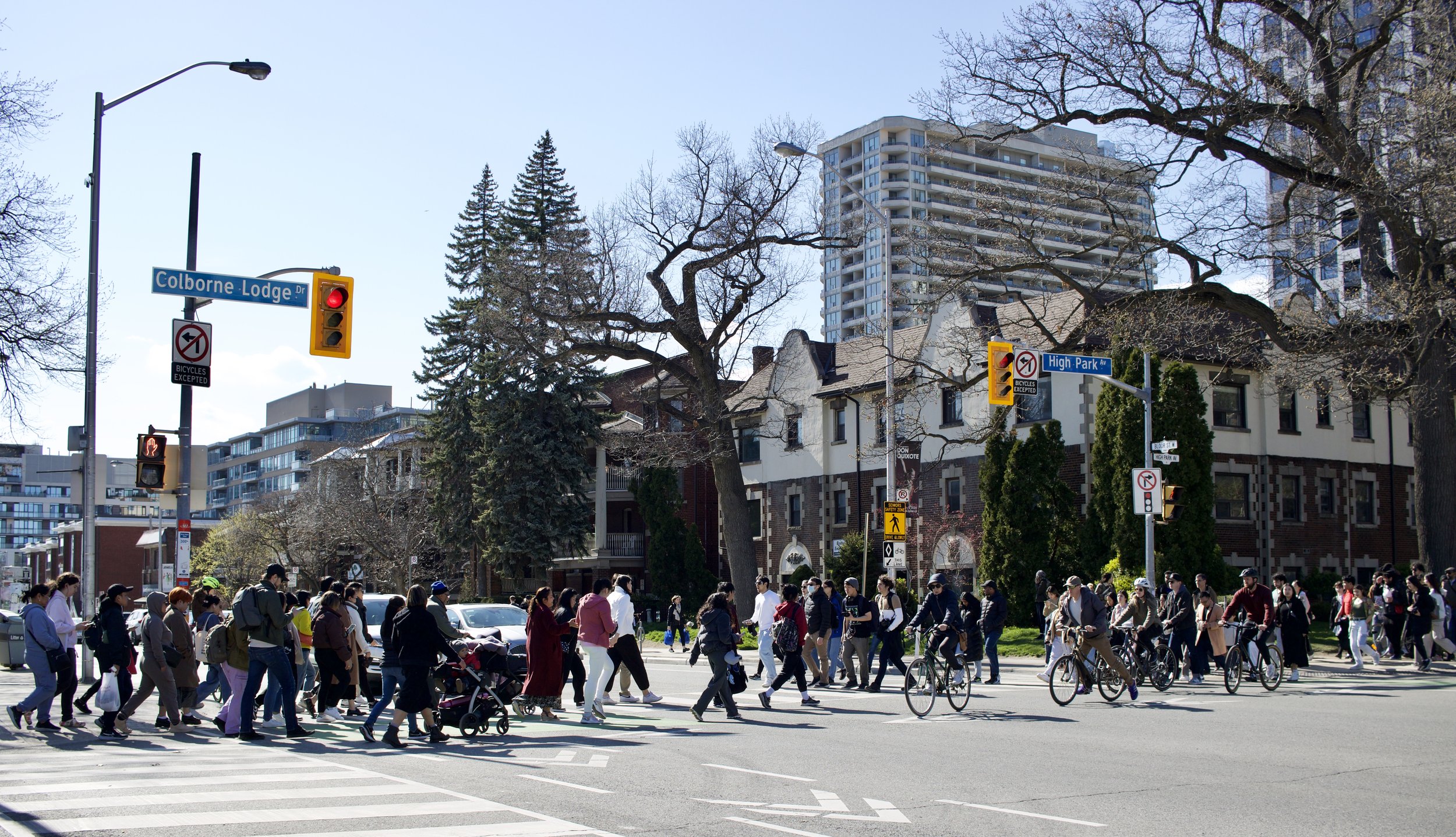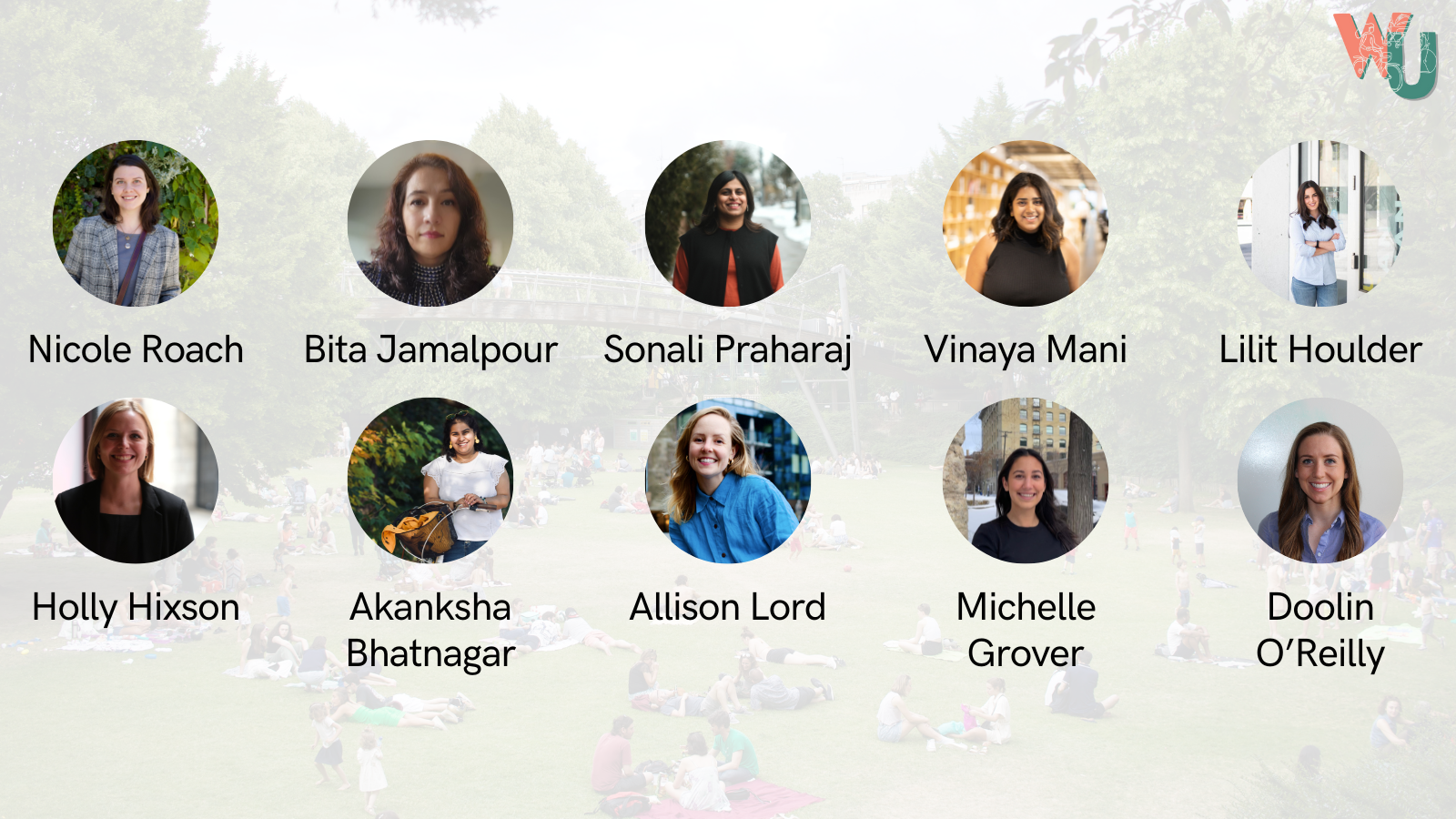Event Recap: Annual General Meeting 2024
Large group of people crossing the street to access High Park in Toronto, ON (photo by: Nicole Roach).
On Tuesday, April 23, 2024, Women in Urbanism Canada (WiUC) hosted our first-ever Annual General Meeting (AGM)! This AGM included guest speakers, report presentations, and voting on key organization matters.
Thank you so much to the many folks who registered, and especially to all those that attended and helped us to reach quorum.
Here is a high-level summary of the meeting, including recaps of presentations, organization updates, and voting results.
Audience
Our audience included guests from Alberta, British Columbia, Manitoba, Nova Scotia, Ontario, Quebec, and even outside of Canada! With 80+ registrations, we were able to reach a quorum of members and welcome non-members to learn more about the organization.
Map of North American-based WiUC members (generated by CommunityBox).
Presentations
Housing and Land-Use Planning with a Feminist Lens
In Tahereh Granpeyeh’s presentation, she spoke to Housing & Land-Use Planning with a Feminist Lens. She began by outlining how traditional zoning for the nuclear family fails women through urban sprawl, limited housing options, and car-dependent communities. Some key stats related to safety, mobility, and housing included:
Women are significantly more likely to say they feel unsafe walking in their neighbourhood at night (36% vs. 21%)
Women are more likely to use public transit and walk for daily commutes
Lack of affordable housing options can limit women’s ability to leave abusive relationships or achieve financial independence
Women in Canada have a homeownership rate 8% lower than men, with single mother’s homeownership rate being 27% lower than fathers
Catching up with these gender gaps presents significant challenges, especially as women are under-represented in decision-making roles related to housing and urban planning. To address this gap, Tahereh recommends the following actions:
Look closer at gender-disaggregated data
Increase representation of women
Adopt gender-based analysis and gender mainstreaming
Foster collaboration
And be the voice…
Tahereh concluded with a quote: “Feminism isn’t about making women strong. Women are already strong. It’s about changing the way the world perceives that strength.” - G.D. Anderson
Feminism and Race in the Context of Urban Planning
In Jane Jae-Kyung Shin’s presentation, she addressed Feminism and Race in the Context of Urban Planning. She began by outlining the history of legislatively enshrined racism in Canada, including devastating and recent examples, such as:
The Indian Act of 1876
Japanese Internment (1940s)
Underground Railroad (19th Century)
Residential Schools (late 1800s-1996)
Jane outlined how these systemic racial injustices continue today, citing increase in hate crimes, workplace racism, racial discrimination in health care, and more examples. She explained various forms of racism, including systemic and structural, institutional, and environmental.
A key example of various forms of racism taking shape through urban planning is Africville, an African-Canadian community formerly situated north of Halifax, Nova Scotia in the 18th century on Mi'kmaq territory. This community had limited city utilities, despite contributing taxes, and was co-located with a jail, an open-pit dump, slaughterhouses, and a hospital for contagious diseases. The City of Halifax eventually destroyed Africville in the 1960s, turning it into an industrial district. Jane further outlined examples of racist urban planning, noting that Toronto’s black population is disproportionately overrepresented in low-income areas of the city, lacking public amenities and facing excessive surveillance and policing tactics.
She connected the stories and statistics to individual experiences, and reminded the audience to think of the insufferable pain behind the numbers, noting that when we see someone else’s human rights denied, we need to all remember it could be our own human rights next.
Jane concluded by outlining that the urban planning profession has a critical opportunity to confront the field's institutionalized racism that perpetuates structural violence, and that the impact of this work can create long-lasting legacies that can be for the better, or for the worse.
Organization Updates
For organization updates, the Chair presented the Chairs Report, covering key organization activities and accomplishments from January 2023 to April 2024, touching on topics related to governance, finance, communications, partnerships and outreach, and policy.
Governance:
On January 5, 2023, the founding Board of Directors incorporated as a national not-for-profit organization under Corporations Canada. In June 2023, the Board launched a Membership program, welcoming Engaged and Supportive Members to support the mission through paid memberships. In July 2023, the Board enacted by special resolution the By-Law No. 1 of the organization.
Key Accomplishments:
Incorporated as a national not-for-profit
Launched membership program
Reached 100+ members
Enacted by-laws No. 1
Finance:
In March 2023, WiUC established a bank account with a credit union. Soon after, the organization received its first micro-grant from TD Park People Grants. Thanks to honoraria and membership income, WiUC was able to pay off all previous liabilities and begin 2024 with reserve funds and prepaid assets.
Key Accomplishments:
Created a credit union account
Received first micro-grant
Paid off all liabilities
Approved for a credit card
Communications:
A majority of WiUC’s activities relate to awareness raising and knowledge sharing through various communication channels, such as the website, newsletter, social media, and media.
The website www.womeninurbanism.ca features a home page, about us page, blogs page, resources page, and more. WiUC publishes between 1-3 blogs/month, including top performing blogs such as How Toxic Masculinity Drives Car Culture, 14 Women Impacting Urbanism in Canada, Snow Clearance isn’t Gender Neutral, Creating Gender Inclusive Public Parks, and How 15-Minute Cities Build Feminist Communities.
WiUC distributes a monthly newsletter that includes latest news, feel-good stories, upcoming events, job postings, volunteer roles, and funding opportunities. A quarterly newsletter also goes out to members, which includes a message from the chairs, organization updates, a member spotlight, opportunities for involvement, resources, and events.
WiUC posts regularly across social media channels, including LinkedIn, Twitter (x), and Instagram. Content types include blogs, days of significance, announcements, updates, newsletters, key statistics, and more.
WiUC engaged with the media on multiple occasions, such as being interviewed by MODUS’ Karen Day for the article Spatial equality: Challenging ‘default male’ design and appearing on CBC Radio Canada’s Y a pas deux matins pareils for the segment À quoi ressemblent les villes conçues pour les femmes?.
Key Accomplishments:
15,000+ website visits
22,000+ website page views
3 blogs reached 1,000+ views & 13 blogs reached 250+ views
500+ newsletter subscribers
5,000+ followers across social media channels
Nearly 250,000 views across social media
4 media interviews
Partnerships & Outreach:
WiUC conducts ongoing outreach and partnership building activities, such as public events, presentations, interviews, and collaborations.
In 2023, WiUC hosted a three-part virtual workshop series, with funding from TD Park People Grants, that focused on creating gender-inclusive public parks in Canadian cities. These workshops were based on parks in Halifax, Winnipeg, and Calgary, and included presentations from local speakers, followed by interactive workshop activities.
WiUC was interviewed by Mustafa Sherif on Episode 369 of the Urbanistica Podcast - Cities for People and collaborated with MOXY for the blog The Feminist Urbanists. We also delivered presentations on Mobility with a Gender Equity Lens for Mobilizing Justice and Gender Equitable Cities in Canada for the International FEM.Network.
Key Accomplishments:
Hosted 3-part virtual workshop series
Delivered 4 public presentations to 225+ people
Policy:
WiUC works to support advocacy initiatives that are aligned with the organization’s mission and values, by signing onto letters, participating in consultations, meeting with elected officials, and participating in coalitions.
The organization has endorsed the Women’s National Housing & Homelessness Network’s Intersectional Feminist Housing Agenda for Canada and signed onto Keep Transit Moving’s 2024 pre-budget submission. WiUC also participated in two equity consultations with the GTHA-based transportation agency, Metrolinx, providing guidance on best practices for gender-equitable public transit. Directors also met with Nova Scotia Member of the Legislative Assembly (MLA), Lisa Lachance, to discuss gender-inclusive public parks, specifically at Point Pleasant Park in Halifax. WiUC has also joined the international FEM.Design Toolbox initiative, organized by the Gendered City, participating in the Research, Data Analysis & Policy working group.
Key Accomplishments:
Endorsed 2 advocacy initiatives
Participated in 2 equity consultations
Met with 1 MLA
Joined an international working group
By-Laws No. 1
The organization by-laws were developed using the Government of Canada’s by-law builder tool for non-profits. It was also cross-referenced with provincial and local examples, pulling together this document from multiple sources of inspiration. It was enacted by the Board in July 2023. The members voted unanimously to confirm the By-Laws No. 1 of the corporation.
Election of Directors
The board of directors was founded in November 2022, with 10 Officers and Directors. All Directors do this work in a volunteer capacity, alongside work, other volunteer roles, family, and so on. This organization wouldn’t be what it is today without the dedicated volunteers that WiUC has had and currently has on the board.
During the meeting, all Directors seeking election introduced themselves, and shared why they are seeking election and what impact they hope to have while on the board. The members voted unanimously to confirm the following 10 Officers and Directors for a two-year term:
Nicole Roach - Chair
Bita Jamalpour - Vice-Chair
Sonali Praharaj - Secretary
Vinaya Mani - Treasurer
Lilit Houlder - Director at Large
Holly Hixson - Director at Large
Akanksha Bhatnagar - Director at Large
Allison Lord - Director at Large
Michelle Grover - Director at Large
Doolin O’Reilly - Director at Large
WiUC’s newly elected Board of Directors.
Visit The Team page to learn more about the board and submit a general interest application to be considered for future openings.
Conclusion
Thank you again to everyone who came out, to our wonderful speakers, our members, and to the board of directors who make this organization run! We are thrilled that we reached quorum and were able to confirm our by-laws and officially elect our directors.
We wish you all a great year, and hope to see you at the AGM in 2025!






